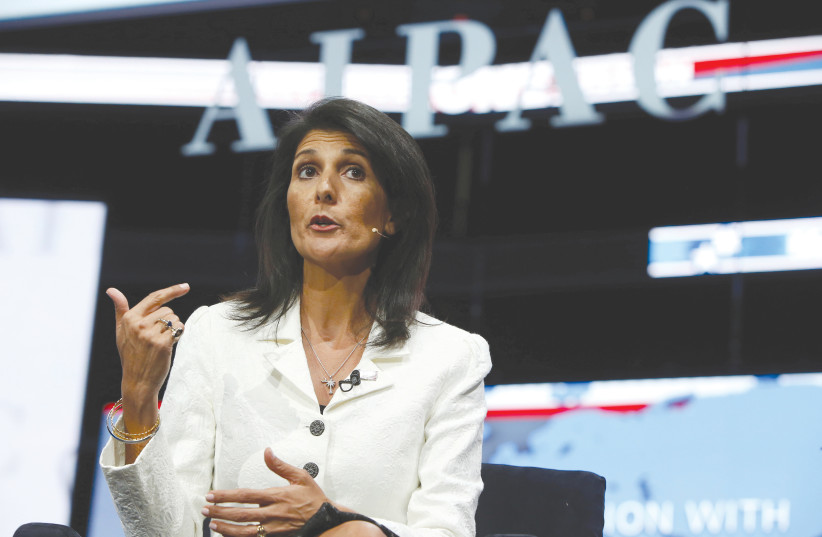Former US ambassador to the UN Nikki Haley on Tuesday said she will seek the Republican presidential nomination in 2024, putting her at odds with her one-time boss Donald Trump, the previous president seeking to win back the White House.
“I’m Nikki Haley, and I’m running for president,” the 51-year-old candidate said in a video that her team sent out by email.
A former South Carolina governor who served as US ambassador to the United Nations under Trump, Haley said she would lay out her campaign plans in a speech on Wednesday in Charleston, South Carolina.
She became Trump’s first direct challenger in a Republican field expected to grow in the coming weeks and months. Her announcement was a sign the Republican nomination race is picking up steam.
Other high-profile Republicans looking at a 2024 run include Florida Gov. Ron DeSantis, former vice president Mike Pence, Sen. Tim Scott (South Carolina), New Hampshire Gov. Chris Sununu and former Arkansas Gov. Asa Hutchinson.

“It’s time for a new generation of leadership – to rediscover fiscal responsibility, secure our border and strengthen our country, our pride and our purpose,” Haley said in her video.
She also harked back to her experience in foreign policy with a folksy flair.
“China and Russia are on the march,” she said. “They all think we can be bullied, kicked. You should know this about me: I don’t put up with bullies. And when you kick back, it hurts them more if you’re wearing heels.”
Trump, 76, whose own campaign has gotten off to a slow start, mocked Haley on February 2 on his Truth Social social-media platform, saying she had earlier said she would support Trump if he ran in 2024.
“Nikki has to follow her heart, not her honor. She should definitely run!” he wrote.
Daughter of immigrants
Haley is the daughter of two Indian immigrants who ran a successful clothing store in a rural part of South Carolina. She has gained a reputation in the Republican Party as a solid conservative who has the ability to address issues of gender and race in a more credible fashion than many of her peers.
She has pitched herself as a stalwart defender of American interests abroad, having served as ambassador to the UN from 2017-18. During that time, America pulled out of the Iran nuclear deal, which was signed under Democratic president Barack Obama and was highly unpopular among Republicans.
Haley is considered a staunch supporter of Israel and, as UN ambassador, vowed to defend the country in the organization’s various forums. She visited Israel as part of a solidarity mission in collaboration with Christians United for Israel (CUFI). “Israelis have a right to defend themselves,” she said during a visit to a home in Ashkelon .
Last summer, Haley hinted that she would become a candidate in the 2024 presidential election, during a speech at CUFI’s 17th annual Washington Summit.
“If this president signs any sort of [Iran nuclear] deal, I’ll make you a promise: The next president will shred it on her first day in office,” Haley said. “Just saying: Sometimes it takes a woman,” she told the cheering crowd.
Best-selling historian Tevi Troy, a senior fellow and director of the Presidential Leadership Initiative at the Bipartisan Policy Center and a former senior White House aide, said: “Nikki Haley is the first non-Trump candidate to enter the 2024 race for the Republican presidential nomination. It’s likely there will be others, but the more that join, the easier it will be for Donald Trump, who has already announced, to split their vote. Haley is presumably hoping that by going in early, she will discourage others and reduce the number of those non-Trump competitors.”
“Haley will likely make a play for the Jewish vote, based on her strong support for Israel as US ambassador to the UN,” he said. “While the Jewish vote for Republican candidates has been generally ticking upwards since George H. W. Bush’s very poor 11% showing in 1992, it has yet to go above the 30% that both Mitt Romney and Donald Trump got in 2012 and 2020.
“There is no chance that the next Republican candidate gets 50% of the Jewish vote in 2024, but political experts will be watching closely to see if that next Republican candidate can get in the mid-30s, which no Republican presidential candidate has done since Ronald Reagan got 35% in 1984,” Troy said.
Scott Lasensky, a lecturer in American Jewish politics at the University of Maryland, said Haley’s positions on Israel while serving as ambassador to the UN “garnered outsized praise, especially among Jewish conservatives, and may help her fundraise among stalwart Republicans, particularly if the primary field gets crowded. But her tenure in the Trump administration remains a liability with the vast majority of Jewish voters.
“More broadly, there’s no sign that any Republican candidate is likely to shift long-established national Jewish voting patterns under present conditions.”
Can Nikki Haley take Democrats' votes away from Biden?
Leonard Saxe, director of the Steinhardt Social Research Institute and Cohen Center for Modern Jewish Studies at Brandeis University, said Haley’s “support for Israel is unlikely to overcome opposition to her domestic policy positions.”
American Jews are overwhelmingly liberal, and more than 70% are Democrats or lean Democratic, he said. “On issues that matter to them, such as healthcare and abortion rights, they are unlikely to support Haley.
“She may represent a conservative alternative to Trump or DeSantis, but there’s no evidence that position will persuade Democrats to support her,” Saxe said.
